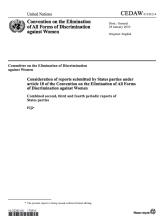Land Library Search
Through our robust search engine, you can search for any item of the over 73,000 highly curated resources in the Land Library.
If you would like to find an overview of what is possible, feel free to peruse the Search Guide.
/ library resources
Showing items 19 through 27 of 40.The Gender in Agriculture Sourcebook provides an up-to-date understanding of gender issues and a rich compilation of compelling evidence of good practices and lessons learned to guide practitioners in integrating gender dimensions into agricultural projects and programs.
This report is based on the proceedings of the Technical Consultation on Gender, Property Rights and Livelihoods in the Era of AIDS, organized by FAO in November 2008.
An exciting new collection inspired by a 2003 Oxfam/FAO workshop in Pretoria. Foreword briefly looks at the struggle for women’s land rights across the globe and the lack of concrete gains. Women have been confronted by resistance and patriarchy.
Collective actions groups have many advantages and are sometimes essential, yet they can reinforce or perpetuate inter-and intra-gender inequalities when their functioning is left entirely subject to internal community dynamics and they are not well managed.
Fiji ratified the UN Convention on the Elimination of All forms of Discrimination Against Women in August, 1995. The initial report was submitted in 2000 and the Fiji delegation appeared before the UN CEDAW Committee of Experts for the constructive dialogue in 2002.
Contains an overview and thematic notes on gendered access to land and property; legal reforms and women’s property rights; land dispute resolution; gender-responsive titling; case studies from Nepal and Honduras; further reading.
Study in the Oromiya and Southern Nations, Nationalities and Peoples regions of Ethiopia assesses the impacts of land registration and certification since 2004, including joint certification for husbands and wives.
Documento realizado para la REUNIÓN TÉCNICA INTERNACIONAL sobre Comunidades Indígenas, Tierra, Desarrollo e Institucionalidad: Experiencias en A. Latina .
Como consecuencia de la III Conferencia Internacional de la Mujer (Nairobi, 1985) los Estados asistentes se comprometieron a crear espacios institucionales encargados de implementar políticas públicas tendientes a la eliminación de la discriminación contra las Mujeres.





